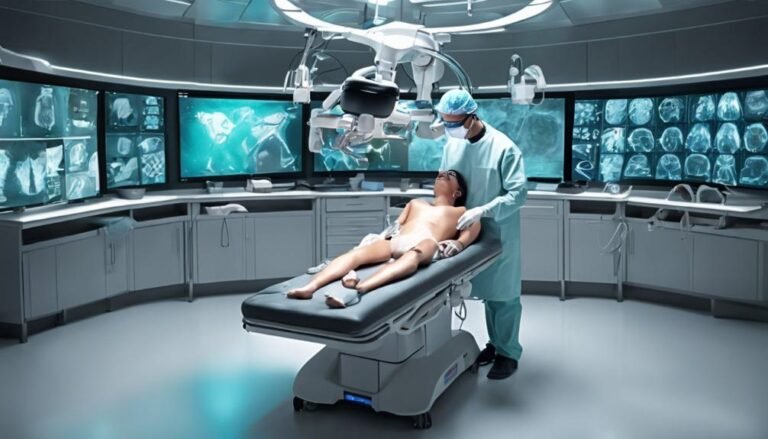AI in Global Health Initiatives
Incorporating AI into Global Health Initiatives offers a glimpse into the future of healthcare innovation. Imagine a world where technology not only assists but actively shapes the way we combat diseases on a global scale. From early detection methods to personalized treatment plans, AI is revolutionizing the landscape of healthcare. As you explore the intricate ways AI is transforming global health, you'll uncover a domain where precision medicine meets predictive analytics, paving the way for a healthier tomorrow.
Key Takeaways
- AI optimizes public health initiatives with data-driven strategies and predictive analytics.
- Precision medicine tailors treatment plans based on individual characteristics with AI technology.
- Machine learning algorithms aid in accurate disease diagnosis and treatment plans.
- AI enhances medical imaging for earlier disease detection and optimized treatment.
- Predictive modeling identifies high-risk populations and customizes interventions for better outcomes.
AI Applications in Disease Diagnosis
In recent years, AI has revolutionized disease diagnosis by enhancing accuracy and efficiency in detecting various health conditions. AI virtual assistants play a vital role in telemedicine, providing support to healthcare providers in diagnosing illnesses remotely.
Through the integration of AI in pathology, medical professionals can leverage technology to analyze complex datasets, leading to more precise disease identification and personalized treatment plans.
Precision medicine, enabled by AI algorithms, tailors medical decisions and treatments to individual patients based on their unique characteristics and genetic makeup. This approach allows for more targeted and effective interventions, improving patient outcomes and reducing healthcare costs in the long run.
Enhancing Healthcare Delivery With AI
Utilizing AI technologies in healthcare delivery has significantly improved operational efficiency and patient outcomes through data-driven decision-making and personalized care interventions. Remote patient monitoring, a key AI application, enables continuous tracking of patient essential signs and symptoms outside traditional healthcare settings. This real-time data collection allows for early detection of health issues and timely interventions, reducing hospital readmissions and improving overall patient well-being.
In addition, predictive analytics, another significant AI tool, analyzes vast amounts of patient data to forecast potential health outcomes and identify individuals at high risk of developing certain conditions. By leveraging these insights, healthcare providers can proactively tailor treatment plans and preventive measures, ultimately leading to better health management and resource allocation.
AI-driven Public Health Interventions
Harnessing artificial intelligence technologies enables the implementation of data-driven strategies in public health initiatives to optimize interventions and outcomes. AI plays a pivotal role in public health surveillance by analyzing vast amounts of data to detect patterns and trends, aiding in the early identification of potential health threats.
Through AI-driven predictive analytics, public health officials can anticipate disease outbreaks, allocate resources efficiently, and implement targeted preventive interventions.
AI enhances the effectiveness of preventive interventions by enabling proactive measures based on predictive modeling. Machine learning algorithms can analyze demographic data, environmental factors, and historical health information to identify high-risk populations and areas. This allows for the customization of interventions tailored to specific communities, ultimately improving the overall impact of public health initiatives.
AI in Medical Imaging Advancements
AI in Global Health Initiatives has greatly advanced the field of medical imaging, revolutionizing diagnostic capabilities and enhancing healthcare outcomes. Machine learning algorithms, a subset of artificial intelligence, have been pivotal in radiology advancements. These algorithms analyze medical images with precision, aiding in the detection of abnormalities that might be missed by human eyes.
Deep learning, a sophisticated form of machine learning, has notably improved diagnostic accuracy in medical imaging. By training neural networks on vast amounts of imaging data, deep learning models can differentiate between various pathologies with high levels of accuracy. This has led to earlier detection of diseases such as cancer, enabling prompt intervention and potentially better patient outcomes.
The integration of AI in medical imaging hasn't only expedited the diagnostic process but has also optimized treatment plans by providing detailed insights based on imaging findings. As technology continues to evolve, the synergy between AI and medical imaging is expected to further enhance healthcare delivery and patient care.
Ethical Considerations in AI Implementation
When implementing AI in global health initiatives, you must consider important ethical aspects such as privacy protection.
It's essential to incorporate bias detection measures to guarantee the fairness and accuracy of AI algorithms in healthcare settings.
Additionally, adhering to informed consent requirements is vital to uphold transparency and respect for individuals' autonomy in the utilization of AI technologies.
Privacy in AI
Considering the potential implications of data privacy breaches and the ethical concerns surrounding AI implementation in global health initiatives is essential for ensuring trust and transparency in these systems. Data protection and security measures play a vital role in safeguarding sensitive information within AI applications used in healthcare settings. Robust encryption methods, access controls, and anonymization techniques are key components in maintaining privacy and preventing unauthorized access to personal health data.
In the context of global health initiatives, where data sharing across borders is common, adherence to stringent data protection regulations such as GDPR and HIPAA becomes indispensable to uphold patient confidentiality and trust. Implementing privacy-preserving AI algorithms that prioritize the anonymization of data while maintaining usability for analysis is a key consideration.
Additionally, transparency in how AI systems handle and process data is fundamental in building trust among stakeholders and ensuring compliance with ethical standards. By prioritizing privacy in AI implementations, global health initiatives can navigate the complex landscape of data privacy while harnessing the benefits of AI technology for improved healthcare outcomes.
Bias Detection Measures
Implementing robust bias detection measures is essential in ensuring the ethical integrity of AI systems utilized in global health initiatives. Algorithmic fairness must be a top priority to prevent unintentional biases that could result in discriminatory outcomes in healthcare decision-making processes.
By incorporating data transparency practices, organizations can enhance the accountability of AI systems and mitigate the risks associated with biased algorithms impacting patient care.
Ensuring algorithmic fairness involves regularly auditing AI models to identify and address any biases present in the data or decision-making processes. This proactive approach allows for the detection and correction of biases before they lead to detrimental consequences for individuals receiving healthcare services.
Encouraging data transparency enables stakeholders to understand how AI systems operate and make decisions, fostering trust in the technology's capabilities and ethical standards.
Informed Consent Requirements
To uphold ethical standards in AI implementation for global health initiatives, ensuring compliance with informed consent requirements is essential. Informed consent is a fundamental ethical principle that necessitates individuals' understanding and agreement before their data is utilized.
In the context of AI in global health initiatives, obtaining informed consent is vital to respect individuals' autonomy and rights over their data. It involves providing clear information about how data will be used, ensuring individuals are aware of potential risks and benefits, and obtaining explicit consent before proceeding.
Data protection is closely intertwined with informed consent in AI implementation. Safeguarding individuals' data privacy and security is essential to maintain trust and comply with regulatory frameworks. Implementing robust data protection measures, such as encryption and access controls, helps prevent unauthorized access or misuse of sensitive health data.
Future Prospects of AI in Global Health
The integration of artificial intelligence (AI) holds significant promise for transforming global health initiatives in the near future. AI-powered vaccination campaigns are set to revolutionize the way vaccines are distributed, ensuring more efficient and targeted vaccination drives. By analyzing vast amounts of data, AI can help identify high-risk populations, optimize vaccine delivery routes, and even predict potential vaccine hesitancy hotspots.
Moreover, AI-driven epidemic prediction stands as an essential tool in averting future health crises. Machine learning algorithms can sift through diverse data sources to detect patterns indicative of disease outbreaks, enabling early intervention and containment strategies. This proactive approach not only saves lives but also mitigates the economic burden associated with large-scale epidemics.
In essence, the future of global health with AI at its core is poised to be more proactive, data-driven, and precise. By harnessing the power of artificial intelligence, health organizations can enhance their response mechanisms, optimize resource allocation, and ultimately work towards a healthier world for all.
Conclusion
In harnessing the power of AI, global health initiatives are propelled towards a future where precision meets compassion, data meets humanity.
The intricate dance of predictive analytics and personalized care strides towards a healthier world, where disease is met with accuracy and treatment with efficiency.
As we navigate the ethical considerations and embrace the possibilities of AI in healthcare, the path to better patient outcomes and optimized public health strategies becomes clearer with each technological advancement.







